-
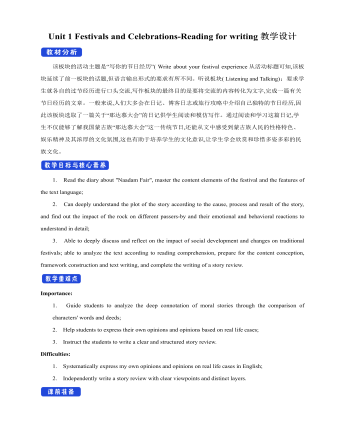
新人教版高中英语必修3Unit 1 Festivals and Celebrations-Reading for writing教学设计二
Step 3 Analyzing article structureActivity 31. Teachers raise questions to guide students to analyze the chapter structure of this diary and think about how to describe the festival experience. (1)What should be included in the opening/body/closing paragraph(s)?(2)How did the writer arrange his/her ideas?(3)What kind of interesting details did the writer describe?(4)How did the writer describe his/her feelings/emotions during the event?2. Students read and compare the three sentence patterns in activity 2. Try to rewrite the first paragraph of the diary with these three sentence patterns. After that, students exchange corrections with their partners. Such as:●This was my first time spending three days experiencing the Naadam Festival in China’s Inner Mongolia Autonomous Region and it was an enjoyable and exciting experience. ●I'll never forget my experience at the Naadam Festival because it was my first time to watch the exciting Mongolian games of horse racing, wrestling, and archery so closely. ●I'll always remember my first experience at the Naadam Festival in China’s Inner Mongolia Autonomous Region because it was so amazing to spend three days witnessing a grand Mongolian ceremony. Step 4 Accumulation of statementsActivity 41. Ask the students to read the diary again. Look for sentences that express feelings and emotions, especially those with the -ing form and the past participle. Such as:● …horse racing, wrestling, and archery, which are all so exciting to watch. ● some amazing performances● I was surprised to see…● I was a little worried about. . . ● feeling really tiredOther emotional statements:●I absolutely enjoyed the archery, too, but the horse races were my favourite part. ●I'm finally back home now, feeling really tired, but celebrating Naadam with my friend was totally worth it. ●He invited me back for the winter to stay in a traditional Mongolian tent and cat hot pot. I can’t wait!2. In addition to the use of the -ing form and the past participle, the teacher should guide the students in the appreciation of these statements, ask them to memorize them, and encourage them to use them reasonably in writing practice.
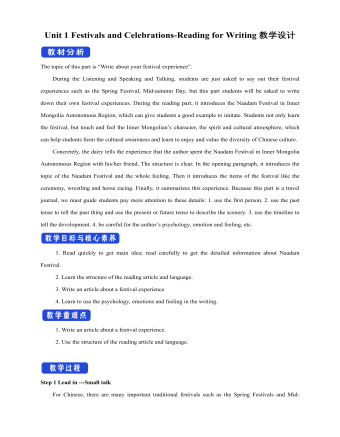
新人教版高中英语必修3Unit 1 Festivals and Celebrations-Reading for Writing教学设计一
The topic of this part is “Write about your festival experience”.During the Listening and Speaking and Talking, students are just asked to say out their festival experiences such as the Spring Festival, Mid-autumn Day, but this part students will be asked to write down their own festival experiences. During the reading part, it introduces the Naadam Festival in Inner Mongolia Autonomous Region, which can give students a good example to imitate. Students not only learn the festival, but touch and feel the Inner Mongolian’s character, the spirit and cultural atmosphere, which can help students form the cultural awareness and learn to enjoy and value the diversity of Chinese culture.Concretely, the dairy tells the experience that the author spent the Naadam Festival in Inner Mongolia Autonomous Region with his/her friend. The structure is clear. In the opening paragraph, it introduces the topic of the Naadam Festival and the whole feeling. Then it introduces the items of the festival like the ceremony, wrestling and horse racing. Finally, it summarizes this experience. Because this part is a travel journal, we must guide students pay more attention to these details: 1. use the first person. 2. use the past tense to tell the past thing and use the present or future tense to describe the scenery. 3. use the timeline to tell the development. 4. be careful for the author’s psychology, emotion and feeling, etc.1. Read quickly to get main idea; read carefully to get the detailed information about Naadam Festival.2. Learn the structure of the reading article and language.3. Write an article about a festival experience4. Learn to use the psychology, emotions and feeling in the writing.1. Write an article about a festival experience.2. Use the structure of the reading article and language.
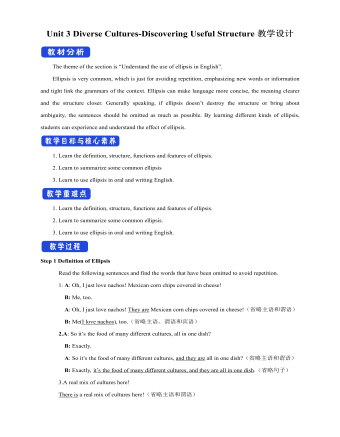
新人教版高中英语必修3Unit 3 Diverse Cultures-Discovering Useful Structure教学设计
Step 4 PracticeRead the conversation. Find out which words have been left out.Justin: Linlin, I’m going to Guizhou Province next month. I’m super excited! Any recommendations for places to visit?Linlin: Wow, cool! Guizhou is a province with a lot of cultural diversity. Places to visit...well, definitely the Huangguoshu Waterfall first.Justin: What’s special about the waterfall?Linlin: Well, have you ever heard of the Chinese novel Journey to the West ?Justin: Yes, I have. Why ?Linlin: In the back of the waterfall, you will find a cave, which is the home of the Monkey King.Justin: Really? Cool! I’ll definitely check it out.Linlin:And I strongly recommend the ethnic minority villages. You’ll find Chinese culture is much more diverse than you thought.Justin:Sounds great, thanks.Answers:Justin: Linlin, I’m going to Guizhou Province next month. I’m super excited! Do you have any recommendations for places to visit?Linlin: Wow, that’s cool! Guizhou is a province with a lot of cultural diversity. What are some places to visit in Guizhou ? Well, definitely the Huangguoshu Waterfall is the first place to visit in Guizhou Province.Justin: What’s special about the waterfall?Linlin: Well, have you ever heard of the Chinese novel Journey to the West ?Justin: Yes, I have heard of the Chinese novel Journey to the West . Why do you ask if I have heard of the Chinese novel Journey to the West?Linlin: In the back of the waterfall, you will find a cave, which is the home of the Monkey King from Journey to the West.Justin: That’s really true? It’s Cool! I’ll definitely check it out.Linlin:And I strongly recommend the ethnic minority villages on your trip to Guizhou Province. You’ll find Chinese culture is much more diverse than you thought it was.Justin:This all sounds great, thanks.
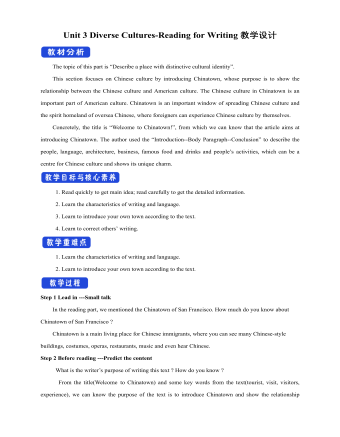
新人教版高中英语必修3Unit 3 Diverse Cultures-Reading for Writing教学设计
The topic of this part is “Describe a place with distinctive cultural identity”.This section focuses on Chinese culture by introducing Chinatown, whose purpose is to show the relationship between the Chinese culture and American culture. The Chinese culture in Chinatown is an important part of American culture. Chinatown is an important window of spreading Chinese culture and the spirit homeland of oversea Chinese, where foreigners can experience Chinese culture by themselves.Concretely, the title is “Welcome to Chinatown!”, from which we can know that the article aims at introducing Chinatown. The author used the “Introduction--Body Paragraph--Conclusion” to describe the people, language, architecture, business, famous food and drinks and people’s activities, which can be a centre for Chinese culture and shows its unique charm.1. Read quickly to get main idea; read carefully to get the detailed information.2. Learn the characteristics of writing and language.3. Learn to introduce your own town according to the text.4. Learn to correct others’ writing.1. Learn the characteristics of writing and language.2. Learn to introduce your own town according to the text.Step 1 Lead in ---Small talkIn the reading part, we mentioned the Chinatown of San Francisco. How much do you know about Chinatown of San Francisco ?Chinatown is a main living place for Chinese immigrants, where you can see many Chinese-style buildings, costumes, operas, restaurants, music and even hear Chinese.Step 2 Before reading ---Predict the contentWhat is the writer’s purpose of writing this text ? How do you know ?From the title(Welcome to Chinatown) and some key words from the text(tourist, visit, visitors, experience), we can know the purpose of the text is to introduce Chinatown and show the relationship between Chinese culture and American culture.
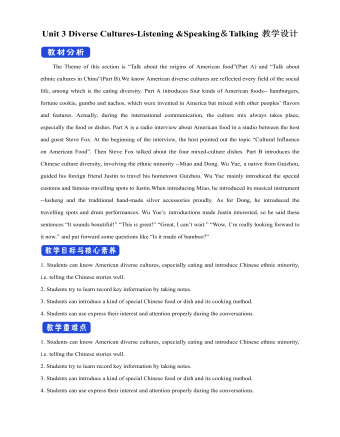
新人教版高中英语必修3Unit 3 Diverse Cultures-Listening &Speaking&Talking教学设计
1. In Picture 1 and Picture 2, where do you think they are from? How do you know?From their wearings, we can know they are from ethnic minority of China--- Miao and Dong.Picture 1, they are playing their traditional instrument lusheng in their traditional costumes.Picture 2. the girls are Miao because they wear their traditional costumes and silver accessory.2. In Picture 3, can you find which village it is? What time is it in the picture?It is Dong village. It is at night. Step 2 While-listeningJustin met a new friend while traveling in Guizhou. Listen to their conversation and complete the summaries below.Part 1Justin and Wu Yue watched some Miao people play the lusheng. The instrument has a history of over 3,000 years and it is even mentioned in the oldest collection of Chinese poetry. Then they watched the lusheng dance. Justin wanted to buy some hand-made silver/traditional accessories as souvenirs. He was told that the price will depend on the percentage of silver. Part 2They will go to a pretty Dong minority village called Zhaoxing. they will see the drum towers and the wind and rain bridges. They may also see a performance of the Grand Song of the Dong people.Step 3 Post-listening---TalkingWork in groups. Imagine Justin is telling some friends about his trip to Guizhou. One of you is Justin and the rest of you are his friends. Ask Justin questions about his trip and experience. The following expressions may help you.
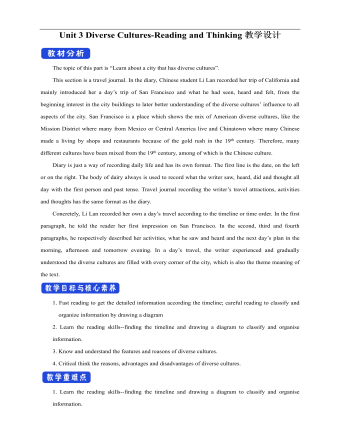
新人教版高中英语必修3Unit 3 Diverse Cultures-Reading and Thinking教学设计
Discuss these questions in groups.Q1: Have you ever been to a place that has a diverse culture ? What do you think about the culture diversity ?One culturally diverse place that I have been to is Harbin, the capital city of Heilongjiang Province. I went there last year with my family to see the Ice and Snow Festival, and I was amazed at how the culture as different to most other Chinese cities. There is a big Russian influence there, with beautiful Russian architecture and lots of interesting restaurants. I learnt that Harbin is called “the Oriental Moscow” and that many Russians settled there to help build the railway over 100 years ago.Q2: What are the benefits and challenges of cultural diversity ?The benefits: People are able to experience a wide variety of cultures, making their lives more interesting, and it can deepen the feelings for our national culture, it is also helpful for us to learn about other outstanding culture, which helps improve the ability to respect others. The challenges: People may have trouble communicating or understanding each other, and it may lead to disappearance of some civilizations and even make some people think “The western moon is rounder than his own.”Step 7 Post reading---RetellComplete the passage according to the text.Today, I arrived back in San Francisco, and it feels good (1) _____(be) back in the city again. The city succeeded in (2)_________ (rebuild) itself after the earthquake that (3)________ (occur) in 1906, and I stayed in the Mission District, enjoying some delicious noodles mixed with cultures. In the afternoon, I headed to a local museum (4)____ showed the historical changes in California. During the gold rush, many Chinese arrived, and some opened up shops and restaurants in Chinatown to earn a (5)_____ (live). Many others worked on (6)______ (farm), joined the gold rush, or went to build the railway that connected California to the east. The museum showed us (7)____ America was built by immigrants from (8)________ (difference) countries and cultures. In the evening, I went to Chinatown, and ate in a Cantonese restaurant that served food on (9)________(beauty) china plates. Tomorrow evening, I’m going to (10)__ jazz bar in the Richmond District. 答案:1. to be 2. rebuilding 3. occurred 4. that 5.living6. farms 7.how 8. different 9. beautiful 10. a
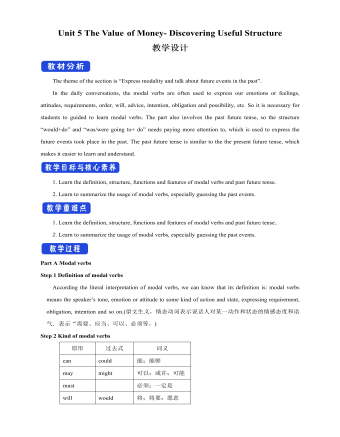
新人教版高中英语必修3Unit 5 The Value of Money- Discovering Useful Structure教学设计
Step 3 Meaning1. 过去将来时表示从过去某一时间来看将要发生的动作或存在的状态, 常用在宾语从句中。一般由“would/should +动词原形”构成。She hoped that they would meet again someday. 她希望将来有一天他们能再见面。2. was/were going to+动词原形: 表示过去将要发生或很有可能发生的动作, 常用于口语中, 表示预言、意图或者打算等。He was going to start work the following week. 他打算下星期开始工作。3. was/were about to do: 常用来表示即将发生的动作, “刚要/正要做……”。注意该结构不与任何时间状语连用。I felt that something terrible was about to happen. 我感到某种可怕的事情即将发生。4.was/were to do: 表示“曾计划做某事”, 如果表示“本来计划做某事, 动作没实现”, 则需用 “was/were to have done”。She said she was to have told me about the accident. 她说她本来想告诉我关于事故的事。5.Start, go, come, leave, see, meet等动词的过去进行时: 表示就过去某一时刻而言即将发生的动作。She was coming later. 她随后就来。I had just put on my overcoat and was leaving to visit a friend of mine. 我刚穿上外套要去看我的一个朋友。
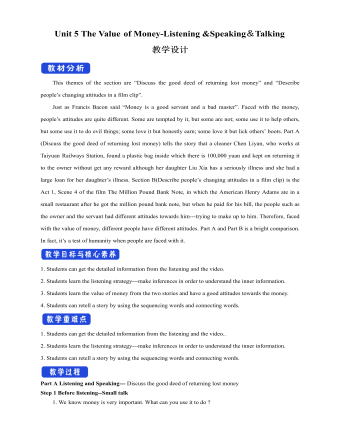
新人教版高中英语必修3Unit 5 The Value of Money-Listening &Speaking&Talking教学设计
4. A:We’d like to have someone to say a word at the beginning to welcome the group.B:↙Who?A:We thought that you or Dr.Johnson might do it.B用降调说Who,其意思是问,对方想让谁在开场时致欢迎词。Step 6 Pronunciation---Practice1. Listen to the short conversation and mark the intonation with ↗, ↙ or ↙, ↗. Then discuss with a partner what they intend to convey by using different intonation.Owner: You know what ?↗ It’s a million-pound bank note↙.Waiter 1: Really ?↗(question)Waiter 2: Really !↙(unbelievable and surprised)Waiter 3: Really ?!↙↗(first question then surprised)2. Listen to the conversations. Underline the parts that are stressed and mark the intonation. Then talk about the implied meanings of the responses with different intonations. Listen again and repeat.1) Henry: It’s a nice suit.Owner: Oh, it’s perfect!↙(The intonation means it is very suitable for Henry.)2) Henry: Well, that’s very kind of you.Owner: Kind, sir ?↗(what you said is not right) No, it’s kind of you. You must come whenever you want and have whatever you like. Just having you sit here is a great honour !!↙(welcome you to come again)3)Henry:Well, to be honest, I have none. Oliver:(happily) What luck!(excited) Brother↗, what luck!↙(It means “Didn’t you hear it?”)Henry: Well, it may seem lucky to you but not to me!↗(angry) If this is your idea of some kind of joke, I don’t think it’s very funny. Now if you’ll excuse me, I ought to be on my way.↙(If so, I would leave.)Roderick: Please don’t go↙...(hope Henry can wait for a moment)Part B Viewing and Talking---Describe people’s changing attitudes in a film clipStep 1 Before-listening---Tell the filmYou are going to watch part of the film The Million Pound Bank Note. Look at these photos and guess what happens in the film.
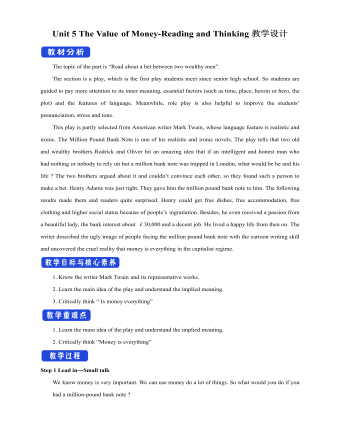
新人教版高中英语必修3Unit 5 The Value of Money-Reading and Thinking教学设计一
Everybody wants to get wealth.In today’s material world,making money or becoming wealthy symbolizes a person’s success and capability. Many people just make every effort, pay any price to attain greater wealth. With money,they can buy nice, large apartments in nice neighborhood. With money they can own luxurious cars. Wealth seems to bring all happiness in life.But is wealth the only road to happiness? Not really. There are many things in the world, which are beyond the means of money, such as friendship, love, health and knowledge. People are so preoccupied with struggling for money that they have no time or would not take the time to form or maintain friendship. What happiness can they feel living as lonely miserable creatures without love or friends in the world even if they accumulate tremendous wealth?In my opinion, people can’t do anything without money, but money is not everything. What money will bring you depends on your personal belief and goal in life. If you are kind enough to help others, especially the poor, money is a good thing to you. With it, you can do much more for the benefit of people and your country, and it will add to your own happiness. If you want money just for your own needs, you’ll never be satisfied or happy. In a word,you should have money spent for more people. Only then can money be the source of your happiness.Step 8 Homework4 students in a group, one acts Roderick, one Oliver, one servant and the fourth one acts Henry Adams, then listen to the tape, pay more attention to the difference between American English and British English in pronunciation, stress, tone.
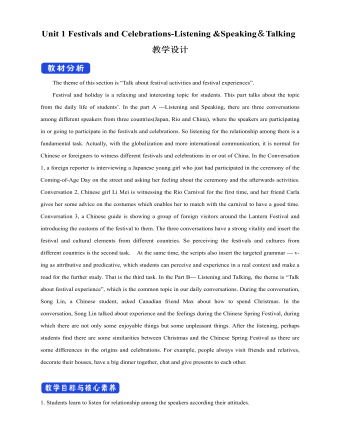
新人教版高中英语必修3Unit 1 Festivals and Celebrations-Listening &Speaking&Talking教学设计
The theme of this section is “Talk about festival activities and festival experiences”.Festival and holiday is a relaxing and interesting topic for students. This part talks about the topic from the daily life of students’. In the part A ---Listening and Speaking, there are three conversations among different speakers from three countries(Japan, Rio and China), where the speakers are participating in or going to participate in the festivals and celebrations. So listening for the relationship among them is a fundamental task. Actually, with the globalization and more international communication, it is normal for Chinese or foreigners to witness different festivals and celebrations in or out of China. In the Conversation 1, a foreign reporter is interviewing a Japanese young girl who just had participated in the ceremony of the Coming-of-Age Day on the street and asking her feeling about the ceremony and the afterwards activities. Conversation 2, Chinese girl Li Mei is witnessing the Rio Carnival for the first time, and her friend Carla gives her some advice on the costumes which enables her to match with the carnival to have a good time. Conversation 3, a Chinese guide is showing a group of foreign visitors around the Lantern Festival and introducing the customs of the festival to them. The three conversations have a strong vitality and insert the festival and cultural elements from different countries. So perceiving the festivals and cultures from different countries is the second task. At the same time, the scripts also insert the targeted grammar --- v-ing as attributive and predicative, which students can perceive and experience in a real context and make a road for the further study. That is the third task. In the Part B--- Listening and Talking, the theme is “Talk about festival experience”, which is the common topic in our daily conversations. During the conversation, Song Lin, a Chinese student, asked Canadian friend Max about how to spend Christmas. In the conversation, Song Lin talked about experience and the feelings during the Chinese Spring Festival, during which there are not only some enjoyable things but some unpleasant things. After the listening, perhaps students find there are some similarities between Christmas and the Chinese Spring Festival as there are some differences in the origins and celebrations. For example, people always visit friends and relatives, decorate their houses, have a big dinner together, chat and give presents to each other.
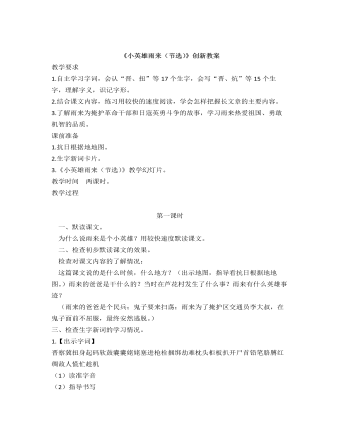
部编人教版四年级下册《小英雄雨来》创新教案
(二)提问:夜校的学习条件怎样?雨来在夜校里受到什么教育?默读第二段。指导朗读:“我们是中国人,我们爱自己的祖国。”“我们——是——中国人,我们——爱——自己的——祖国。”讨论段意和小标题。(段意:雨来上夜校,受到爱国主义教育。)(小标题:“雨来上夜校。”)(三)学习第三段。默读课文,提问:这段主要说了几层意思?学生默读课文,小组交流,展示如下:(两层意思:第一层从“有一天”至“只从街上传来一两声狗叫”,主要写鬼子开始扫荡了;第二层从“第二天”至这段结束,主要写雨来为掩护交通员李大叔,被鬼子捆绑起来了。)指导朗读第二层。重点朗读:“他抬头一看,是李大叔。”“咦!这是什么时候挖的洞呢?”“把缸搬回原地方。你就快到别的院里去,对谁也不许说。”讨论段意和小标题。段意:(雨来为掩护交通员李大叔,被鬼子捆绑起来了。)(小标题:“雨来掩护李大叔”。)
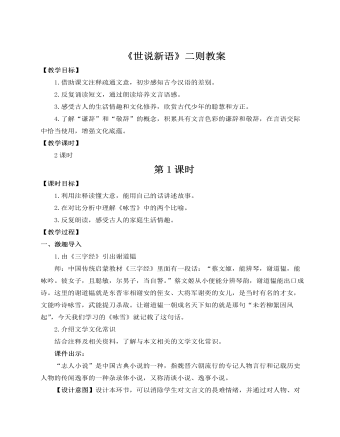
人教部编版七年级语文上册《世说新语》二则教案
“志人小说”中的“志人”这个名称,是鲁迅从“志怪”推衍出来的。“志人”这个名目,为鲁迅《中国小说的历史的变迁》所设立,与“志怪”相对而言。《中国小说史略》又说:“记人间事者已甚古,列御寇韩非皆有录载,惟其所以录载者,列在用以喻道,韩在储以论政。若为赏心而作,则实萌芽于魏而盛大于晋,虽不免追随俗尚,或供揣摩,然要为远实用而近娱乐矣。”这里提出的观点很重要,即所谓志人小说,其写作目的,虽仍有记录史实、供人揣摩的考虑,但欣赏和娱乐的特点已经很强。志人小说在数量上仅次于志怪小说,是在品藻人物的社会风气影响之下形成的。魏晋南北朝的志人小说的艺术特点有以下四个方面:一是以真人真事为描写对象;二是以“丛残小语”、尺幅短书为主要形式;三是善于运用典型细节描写和对比衬托手法,突出刻画人物某一方面的性格特征;四是语言简练朴素,生动优美,言约旨丰。这些艺术特点对后世小说产生了很大影响。
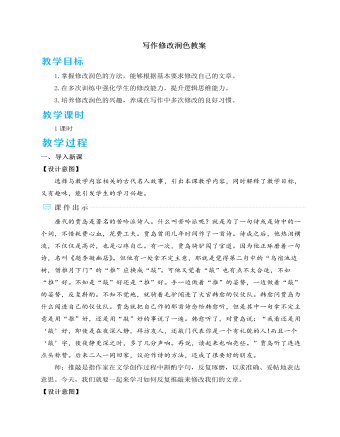
人教部编版语文九年级下册写作修改润色教案
一个人的灵魂总是会在他的眼睛和语言里得到表露。灵魂高尚者,眼光明亮,语言高雅。反过来,我们也可以通过个人的眼睛和语言而窥视到他的灵魂,眼神淫邪,语言污秽,他的灵魂必定卑鄙肮脏。修改指导:这段论述用正反双向说理的方法阐明了一个人的灵魂、眼睛、语言三者之间的关系,条理清楚,语言简明,从思维和阐述上来看,应该说是准确严密的。但是,我们可以将语言润色,使原文变得更好。修改示例:灵魂储藏在人的心中,闪动在人的眼里,表露在人的嘴上。眼睛足以传情。它毫不掩饰地展现出你的学识、品性和情操:也许你貌不惊人,眼小如豆,但它却可以流露出华美的气质;也许你美目流盼,但却可能有一个蜷曲衰败的灵魂在其中沉睡。师:精妙地运用动词,恰到好处地使用比喻、对比等修辞手法,巧妙地使用假设句式,使文章在阐释事理的同时也不乏生动形象。【设计意图】把握了习作的要求后,给学生几个片段尝试修改。学生先从“言”和“意”等方面来进行修改,教师再具体示范指导,为综合修改全文做准备。
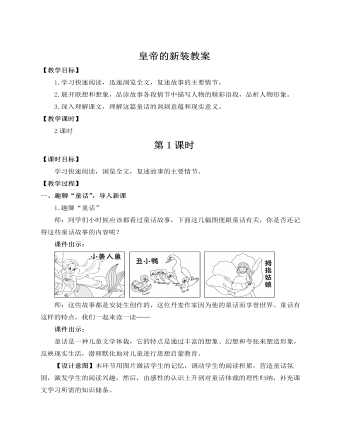
人教部编版七年级语文上册皇帝的新装教案
《皇帝的新装》这篇童话写于1837年。18世纪末19世纪初,西欧资本主义得到迅速发展,而处于北欧边陲的丹麦却还是个君主立宪制国家。拿破仑战争最激烈的时候,丹麦统治阶级利用英法矛盾,以中立地位大搞海上粮食贸易,引起英国不满,英国要求丹麦交出从事贸易的舰队和商船,成为英国的附庸国。丹麦拒绝这一要求,英军于1807年炮击哥本哈根,摧毁了丹麦的舰队,丹麦便由中立倒向拿破仑一边,成为交战国。8年后,拿破仑战败,丹麦也成为战败国而失去广大领土,耗尽了钱财,银行倒闭,农村萧条,刚刚兴起的工业也全部破产,丹麦最终成了英国的附庸国。丹麦人民身受本国封建阶级和英国资产阶级的双重剥削,过着饥寒交迫的贫困生活,而封建统治阶级则穷奢极欲,挥霍无度。面对这样的社会现实,安徒生根据西班牙一则民间故事改编了《皇帝的新装》,把揭露的锋芒直指封建统治阶级的头子,并无情地嘲讽了贵族、宫廷的丑恶行径,深刻地解剖了当时社会的病状。【资料链接】
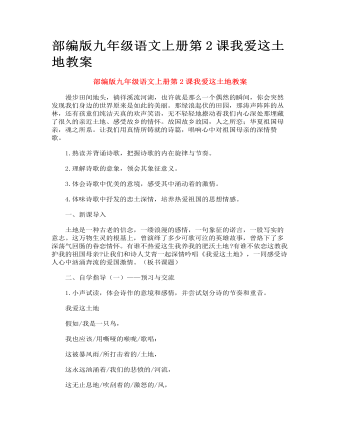
部编版九年级语文上册第2课我爱这土地教案
整体感知 齐诵诗歌,说说这首诗歌紧扣“土地”,作了哪些形象性的描述。 【交流点拨】点出土地情结。起始两句,诗人对土地的热爱,已到了不知道如何倾诉的地步,于是他舍弃人的思维语言而借用鸟的简单朴素的语言倾泻他的感情。“嘶哑”的歌声正能抒发作者对土地的义无反顾的眷恋和执着,于是土地情结的激越歌声由此响起。 倾吐土地情结。“被暴风雨所打击着的土地”“悲愤的河流”“激怒的风”“无比温柔的黎明”是作者所歌唱的对象,诗人没有沉溺于对“温柔”恬静的“黎明”的欣赏中,为了让自己的爱永远留给土地,他做出了庄严郑重的选择。 升华土地情结。一问一答,诗人由借鸟抒情转入直抒胸臆。太“深沉”太强烈的土地情结,已使人难以诉诸语言,只能凝成晶莹的泪水。“深沉”一词也许达不到与实际感情相适应的强度,于是其后紧跟着沉重的省略号。省略号中似乎涌动着潜流地火一般的激情,更为沉重地叩击着读者的心房,激起读者持续的共鸣。
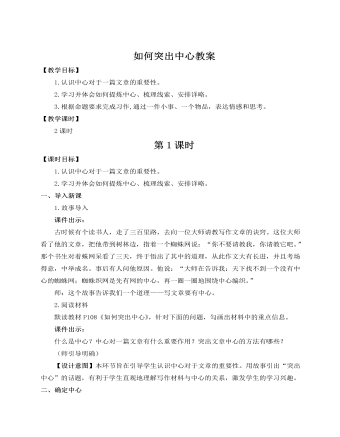
人教部编版七年级语文上册如何突出中心教案
我们一家乘车行驶在黄土高原上,眺望远处云朵,尽情享受着清风的洗礼……因为我们要回老家喽!倘若乖乖地欣赏美景,是坐不住的。虽说有起伏不定的高原,波涛汹涌的黄河,不时从石缝里“蹦”出来的水丝帘,一望澄澈的蓝天,悠然飘过的白云……可当这一切的美景同时“刷”在你的眼前,且接连不断地出现时,还是会让你感到几分乏味。因为,这可是八小时的长途跋涉啊!每到这时候,车里的人们就疯狂了起来。虽说只有区区四人,可还是组成了一个超级合唱团。不信你看爸爸已经兴奋起来。只见他清清嗓子,扭动身子,接着便“肆无忌惮”地高声唱起来。妈妈则是一副欲唱又止的样子,最终也只是淡淡地笑了笑。在这一刹那,妈妈神情是最复杂也是最可爱的。是快乐还是骄傲?是幸福还是羞涩?总之,略有些放不开。后来,她也开始有节奏地在车门上敲击,敲出一串美妙又兴奋的声音。好像她所有的快乐都被谱成了一首无拘无束的歌。
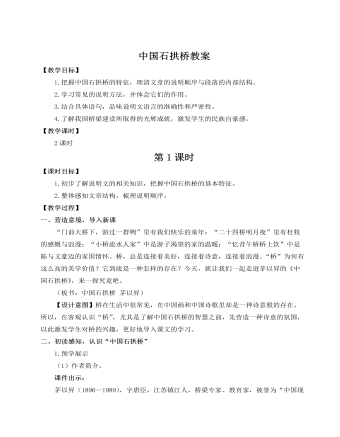
人教部编版语文八年级上册中国石拱桥教案
中国的拱桥的历史可追溯到东汉时期,至今已有一千八百多年。中国的拱桥别具一格,造型优美,曲线圆润,形式多样,世界罕见。拱桥按照建筑材料分为石拱桥、砖拱桥和木拱桥,其中较为常见的是石拱桥。拱桥又分为单拱、双拱、多拱,拱的多少根据河面的宽度而定。多拱桥一般正中间的拱较大,两边的拱略小。根据拱的形状,又分五边、半圆、尖拱、坦拱。桥面上铺板,桥边有栏杆。单孔拱桥的拱形呈抛物线的形状,如北京颐和园的汉白玉石桥玉带桥。多孔拱桥适于跨度较大的宽广水面,常见的多为三、五、七孔,以奇数为多,偶数较少。当多孔拱桥某个孔的主拱受荷时,能通过桥墩的变形或拱上结构的作用把荷载由近及远地传递到其他孔主拱上去,这样的拱桥称为连续拱桥,简称“联拱”。如建于唐代元和年间的古桥苏州宝带桥,桥下共有53个孔相连,桥孔之多,结构之精巧,为中外建桥史上所罕见。
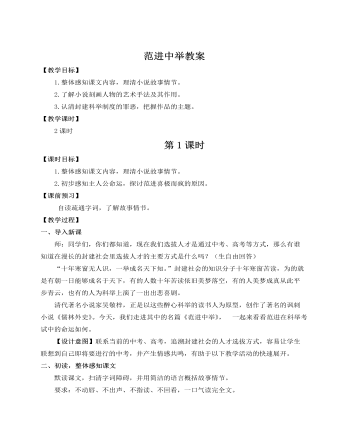
人教部编版语文九年级上册范进中举教案
3.归纳主旨本文通过描写范进参加乡试中了举人一事,运用夸张的手法刻画了他为科举考试喜极而疯的形象,用岳丈在范进中举前后的极其鲜明的肢体动作和言语表情,以及中举后邻居对他的前呼后拥和乡绅赠屋等行为,刻画了一个趋炎附势、热衷仕途、好官名利禄的封建知识分子形象,并且谴责了世态炎凉的可耻的社会风气,对当时的社会及其阴暗面进行了辛辣的讽刺。【设计意图】本板块研读品析了文本中的若干次要人物,引导学生理解次要人物的作用,体会本文侧面烘托的写法,揭示社会环境,点明范进悲剧的必然性,进一步挖掘本文的主旨,使学生理解文本深刻的现实意义。结束语:范进,一个让人啼笑皆非的人物,他卑微可怜,热衷科举,丑态百出。文章塑造这个下层知识分子的典型形象,深刻揭露并辛辣地讽刺了封建科举制度,揭露了封建科举制度的腐朽及其对读书人的腐蚀和毒害。如今,科举制度早已被废除,我们有着公平的人才选拔方式,希望同学们可以珍惜每一个机会,好好努力,实现自己的理想抱负。【板书设计】
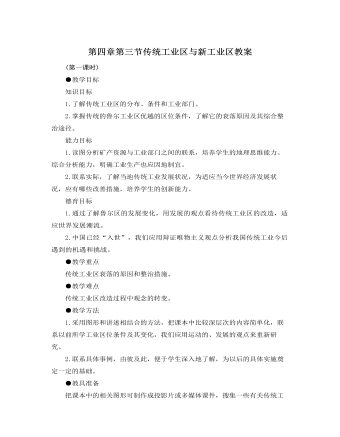
人教版新课标高中地理必修2第四章第三节传统工业区与新工业区教案
知识目标1.了解传统工业区的分布、条件和工业部门。2.掌握传统的鲁尔工业区优越的区位条件,了解它的衰落原因及其综合整治途径。能力目标1.读图分析矿产资源与工业部门之间的联系,培养学生的地理思维能力、综合分析能力,明确工业生产也应因地制宜。2.联系实际,了解当地传统工业发展状况,为适应当今世界经济发展状况,应有哪些改善措施,培养学生的创新能力。德育目标1.通过了解鲁尔区的发展变化,用发展的观点看待传统工业区的改造,适应世界发展潮流。2.中国已经“入世”,我们应用辩证唯物主义观点分析我国传统工业今后遇到的机遇和挑战。
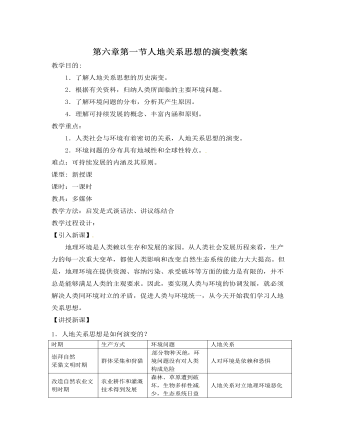
人教版新课标高中地理必修2第六章第一节人地关系思想的演变教案
环境问题 是伴着人口问题、资源问题和发展问题产生。本质是发展问题 ,可持续发展。6分析可持续发展的概念、内涵和 原则?可持续发展的含义:可持续发展是这样的发展,它既满足当代人的需求,而又不损害后代人满足其需求的能力。可持续发展的内涵:生态持续发展 ,发展的基础;经济持续发展,发展条件;社会持续发展,发展目的。可持续发展的原则:公平性原则——代内、代际、人与物、国家与地区之间;持续性原则——经济活动保持在资源环境承载力之内;共同性原则— —地球是一个整体。【总结新课】可持续发 展的含义:可持续发展是这样的发展,它既满足当代人的需求,而又不损害后代人满足其需求的能力。可持续发展的内涵:生态持续发展,发展的基础;经济持续发展,发展条件;社会持续发展,发展目的。





















